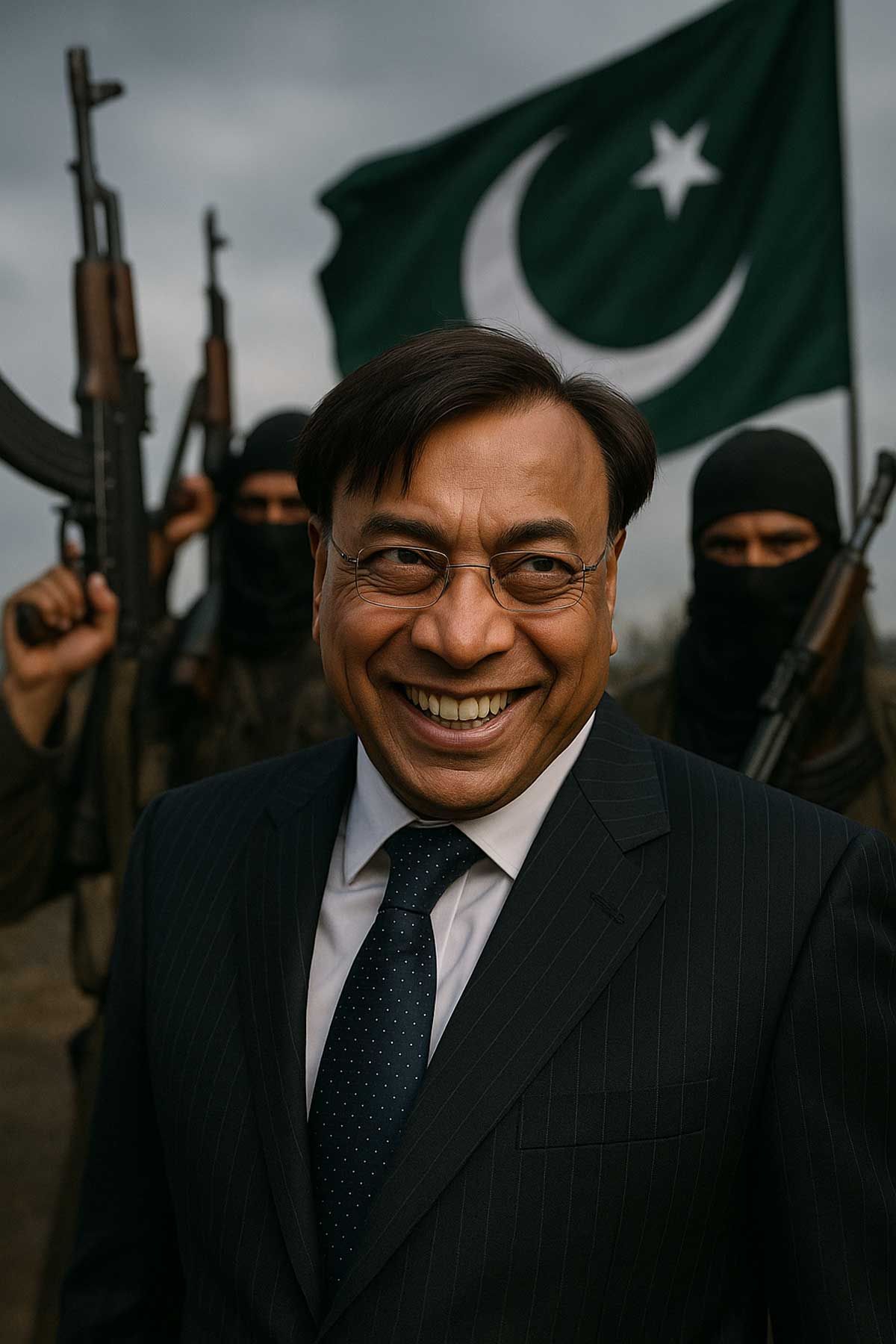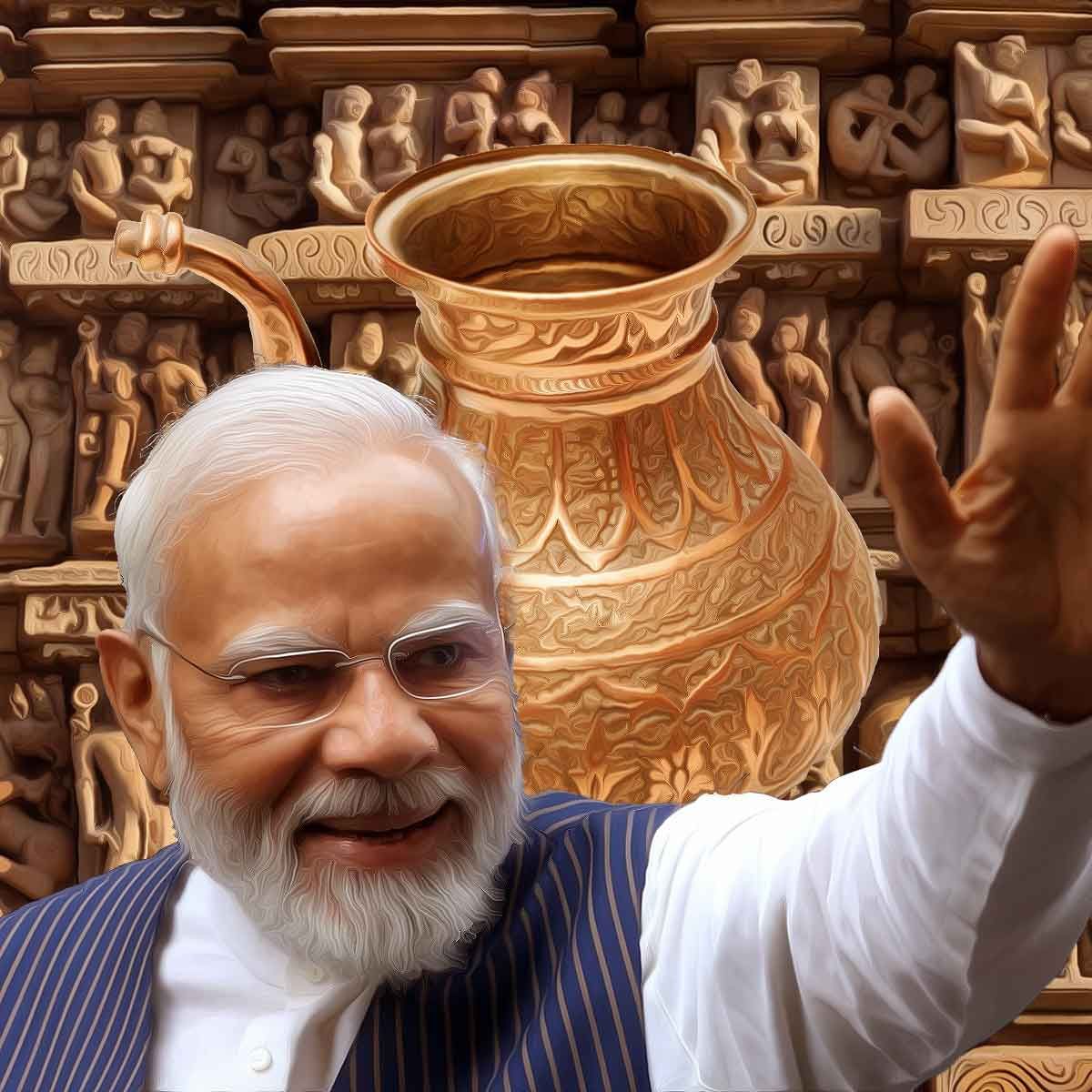MORE COVERAGE
Twitter Coverage
Satyaagrah
Written on
Satyaagrah
Written on
Satyaagrah
Written on
Satyaagrah
Written on
Satyaagrah
Written on
JOIN SATYAAGRAH SOCIAL MEDIA
Just days after 26 Hindus were killed in the Pahalgam terror attack, Harvard—via Lakshmi Mittal’s ₹207 crore-funded institute—hosted a Pakistan conference glorifying its image while whitewashing terror links and amplifying anti-India narratives globally

The devastating Pahalgam terror attack on April 22, 2025, left a deep scar on India, claiming the lives of 26 Hindu tourists in a brutal assault at Baisaran meadow. Just days later, on April 27, 2025, a high-profile event unfolded at Harvard University that has sparked outrage and raised serious questions about the intentions behind it. The Pakistan Conference 2025, organized under the Lakshmi Mittal and Family South Asia Institute—funded by Indian-origin steel magnate Lakshmi Mittal—was held with an air of academic prestige.
|
However, many see it as a calculated attempt by Pakistan to polish its tarnished image as a hub of global terrorism while pushing anti-India narratives. This conference, attended by over 300 people and featuring more than 20 panels, has ignited a firestorm of criticism for its timing and agenda, especially in the wake of such a tragic event.
The conference, titled “Bridging Divides, Building Tomorrow: Pakistan’s Path to Inclusive Growth and Governance,” presented itself as a platform to discuss Pakistan’s arts, culture, and heritage. On the surface, it appeared to be a scholarly effort to foster dialogue. But beneath this polished exterior, critics argue it served a far more troubling purpose: to whitewash Pakistan’s long history of supporting terrorism and to subtly amplify narratives that undermine India’s sovereignty and cultural identity. The event’s academic veneer, backed by Harvard’s global reputation, lent it an air of legitimacy that many find deeply concerning, especially given its proximity to the Pahalgam attack. As one Indian student at Harvard put it, the conference felt like “a slap in the face” to those grieving the loss of innocent lives in Kashmir.
A Network of Partners with Questionable Timing
The Pakistan Conference 2025 was not a standalone event but a collaborative effort involving several prominent organizations. Its partners included National Foods Limited, a major Pakistani food company with a global footprint, and the United States Educational Foundation in Pakistan, known for administering programs like Fulbright. Other collaborators were ClassACT HR ’73, a Harvard-Radcliffe alumni initiative, and the Program on Law and Society in the Muslim World at Harvard Law School. The involvement of the Lakshmi Mittal and Family South Asia Institute—funded by an Indian billionaire—has drawn particular scrutiny, with critics questioning why an institute bearing an Indian name would back an event seen as glorifying Pakistan at such a sensitive time.
The timeline of events leading up to the conference paints a troubling picture. On April 16, 2025, Pakistan’s Army Chief Asim Munir declared Kashmir as Pakistan’s “jugular vein,” a provocative statement signaling Islamabad’s unrelenting focus on the disputed region. Just four days later, on April 20, Baisaran Valley in Pahalgam was opened to tourists without adequate security clearance, a decision that proved catastrophic. On April 22, the horrific attack by The Resistance Front (TRF), a group with links to Pakistan-based Lashkar-e-Taiba (LeT) and Inter-Services Intelligence (ISI) safehouses, claimed 26 lives. Then, on April 27, the Harvard conference went ahead, projecting Pakistan as a progressive nation striving for inclusive growth, with no mention of the bloodshed in Pahalgam. This sequence of events has led many to view the conference as part of a broader strategy to deflect attention from Pakistan’s role in fostering terrorism.
|
Harvard’s Troubling Role in Shaping Narratives
The controversy surrounding the Pakistan Conference has brought renewed attention to Harvard’s history of promoting narratives that critics argue distort India’s cultural and historical identity. In his book Snakes in the Ganga, author Rajiv Malhotra accuses Harvard of using its academic platforms to push divisive ideologies through Marxist and Leftist frameworks. He specifically points to institutes like the Lakshmi Mittal South Asia Institute (funded with ₹207 crore), the Murthy Classical Library (backed by Infosys), the Mahindra Humanities Centre, and the Piramal School of Public Health as platforms that promote critical theories vilifying Hindu traditions. According to Malhotra, these initiatives often frame Indian culture as regressive while downplaying or ignoring the complexities of regional conflicts like Kashmir.
Harvard’s influence extends beyond academia to Indian media, with partnerships involving outlets like The Wire, Sabrang, The Caravan, and The National Herald. Through programs like the Nieman Foundation, Harvard shapes journalistic narratives that frequently refer to Kashmir as “Indian-administered” and describe terrorists as “militants,” terms that critics argue sanitize Pakistan’s role in fueling violence. Malhotra also claims that Indian students at Harvard are often exposed to anti-India ideologies, which they later carry into influential roles in government, academia, and media. He cites the 2008 UPA government’s allocation of ₹372.82 crore for an Amartya Sen chair at Harvard as an example of Indian resources being used to fund institutions that undermine India’s interests.
At the heart of the controversy is Lakshmi Mittal, whose funding of the Lakshmi Mittal and Family South Asia Institute has come under intense scrutiny. While the institute claims to advance research on South Asia, its decision to host a conference that critics say glorified Pakistan—while ignoring the Pahalgam attack—has been labeled a betrayal by many. Speakers at the conference, including historian Dr. Ayesha Jalal and former Pakistani minister Miftah Ismail, portrayed Pakistan as a vibrant hub of culture and reform, a narrative that starkly contrasted with the reality of its alleged support for terrorism. Social media posts on X have been scathing, with one user lamenting, “Money doesn’t guarantee patriotism,” in reference to Mittal’s role.
Critics argue that the conference exemplifies what Malhotra calls Harvard’s “good cop” academic façade—a strategy of using intellectual prestige to mask deeper anti-India agendas while leveraging Indian wealth. The fact that an institute bearing an Indian name and funded by an Indian billionaire hosted such an event has left many questioning Mittal’s priorities. As one commentator on X put it, “Lakshmi Mittal sponsors a Paki conference at Harvard. What does he gain from this?!” The sentiment reflects a growing frustration among Indians who feel that their own elite are inadvertently enabling narratives that harm the nation.
|
A Broader Geopolitical Game
The Pakistan Conference cannot be viewed in isolation but as part of a larger geopolitical strategy. For decades, Western powers have supported Pakistan to counterbalance India’s growing influence in South Asia. Pakistan’s military, bolstered by billions in U.S. aid, has been accused of serving as a tool to destabilize India, a dynamic that critics say is often downplayed by Western media outlets like The New York Times. Pakistan’s former defense minister Khawaja Asif has himself admitted to Western-backed terrorism, yet such revelations rarely make headlines in global media.
Harvard’s global network, spanning academia, media, and policy circles, plays a pivotal role in shaping international perceptions. Indian-funded initiatives at the university, such as translations of Indian texts or projects like the Dalit Panthers, are often criticized for pushing intellectual colonization—reframing India’s history and culture through a Western lens that emphasizes division and conflict. The Pakistan Conference, with its focus on Pakistan’s “inclusive growth,” is seen as a continuation of this trend, using Harvard’s platform to sanitize Pakistan’s image while ignoring its role in incidents like the Pahalgam attack.
Calls for Accountability
The backlash against the Pakistan Conference has been swift and vocal. Indian students at Harvard have urged the university to take a stand, issuing a letter that reads, “We respectfully request that Harvard University: 1. Issue a public statement condemning the Pahalgam terror attacks and affirming support for victims of religion-based violence. 2. Review the participation of Pakistani officials at the Pakistan Conference 2025 in light of their government’s ideological and rhetorical support for groups like LeT. 3. Provide emotional and institutional support to affected students through the Office for Equity, Diversity, Inclusion, and Belonging.” This demand reflects a broader call for accountability, not just from Harvard but also from Indian businessmen like Mittal, whose funds are seen as enabling these controversial narratives.
The timing of the conference—just five days after the Pahalgam attack—has only deepened the sense of betrayal. For many, it is not just an academic event but a stark reminder of how global platforms can be used to manipulate narratives. As one X user poignantly noted, “It is a shame that after the #Pahalgam attack, the ‘Pakistan conference at Harvard’ is being held with the Lakshmi Mittal and Family South Asia Institute being a partner. This is quite unfortunate and must be stood against strongly!” The sentiment captures the growing demand for transparency and responsibility from institutions and individuals who wield significant influence.
In the aftermath of the Pahalgam tragedy, the Pakistan Conference 2025 stands as a troubling example of how academic prestige can be co-opted to serve geopolitical agendas. For India, it is a call to reassess the role of its wealth and influence in global institutions, ensuring that they align with the nation’s interests and values. As the wounds of Pahalgam remain fresh, the controversy surrounding Harvard’s conference serves as a sobering reminder of the power of narratives—and the need to challenge those that seek to distort the truth.
 Support Us
Support Us
Satyagraha was born from the heart of our land, with an undying aim to unveil the true essence of Bharat. It seeks to illuminate the hidden tales of our valiant freedom fighters and the rich chronicles that haven't yet sung their complete melody in the mainstream.
While platforms like NDTV and 'The Wire' effortlessly garner funds under the banner of safeguarding democracy, we at Satyagraha walk a different path. Our strength and resonance come from you. In this journey to weave a stronger Bharat, every little contribution amplifies our voice. Let's come together, contribute as you can, and champion the true spirit of our nation.
 |  |  |
| ICICI Bank of Satyaagrah | Razorpay Bank of Satyaagrah | PayPal Bank of Satyaagrah - For International Payments |
If all above doesn't work, then try the LINK below:
Please share the article on other platforms
DISCLAIMER: The author is solely responsible for the views expressed in this article. The author carries the responsibility for citing and/or licensing of images utilized within the text. The website also frequently uses non-commercial images for representational purposes only in line with the article. We are not responsible for the authenticity of such images. If some images have a copyright issue, we request the person/entity to contact us at This email address is being protected from spambots. You need JavaScript enabled to view it. and we will take the necessary actions to resolve the issue.
Related Articles
- NewsClick's covert ties with China unveiled: a web of deceit spanning shell corporations, activists, and propaganda, revelations from the ED and New York Times spotlight Neville Roy Singham at the epicenter of a global Chinese influence scheme
- "What a network": For a withheld tweet of Washington Post columnist Rana Ayyub, she gets support from several ‘journalists’, ‘activists’ and ‘prominent personalities’, people linked to George Soros and his funded Open Society stood out from crowd
- Anti-Brahmin rants, mobilizing the Muslim community, Cow protection, bringing ‘Hindustan to knees’, incitement to violence, and many more: Detail analysis of order framing sedition, other charges against Sharjeel Imam
- Modi govt crushed Soros-funded Reporters’ Collective’s falsehoods by revoking its non-profit status after it peddled fake poverty data, ignoring NITI Aayog’s work with OPHI & UNDP, while being bankrolled by Ford, Omidyar, Rockefeller, and Open Society
- "Diving deep into the Congress-China connection reveals a web of ties": Jairam Ramesh's Huawei affinity, the Gandhis' MoU with CCP, and closed-door meetings; such undisclosed affiliations raise questions about transparency and India's sovereignty
- Congress leader spreads vaccine hesitancy again, this time claims newborn calves are slaughtered for their serum. Here is the truth
- Biggest Secret Reveal - How ties between Indra Gandhi and KGB made India a puppet of USSR during the Cold War
- "Profit Over Patriotism, Mahua Cash Query Dish": IT Minister Chandrasekhar unveils Moitra's possible favoritism towards private firms; Adani Group highlights orchestrated attacks; BJP's Dubey alleges Moitra's Parliament misconduct linked to Hiranandani
- "Ship in port is safe, but that's not what ships are built for": Deep-water, multipurpose, international seaport and container transshipment terminal at Vizhinjam that will compete with Colombo, Singapore and Dubai meets Church-led protests in Kerala
- Mumbai ATS tortured and forced witness in the 2008 Malegaon blast case to falsely accuse Yogi Adityanath and RSS leaders
- "If you see fraud and do not say fraud, you are a fraud": Systemic deficiency and the nexus between police, passport agents and passport officials come to light with Tamil Nadu BJP President K Annamalai going hammer and tongs about ‘Fake Passport Scam'
- Terrorist Organization SFJ chief Pannu threatens PM Modi and India after the security breach, says ‘Tiranga wale fled from Punjab’
- Sonam Wangchuk, after attending Pakistan's climate conference hosted by Dawn Media, led Pune protests against the Riverfront project, previously insulted Lord Ram and Mata Sita, opposed Ladakh's army construction and faced backlash for anti-India activism
- "Tragedy is a sharp contrast between what is and what could have been": Odisha train tragedy, which claimed the lives of 289 people has taken a new turn following the interrogation of junior engineer (JE) Amir Khan by the Central Bureau of Investigation
- The former RAW officer claims that Ex Muslim Vice President Hamid Ansari while serving as an Indian Ambassador to Iran exposed the RAW set-up in Tehran endangering the lives of RAW unit members

























